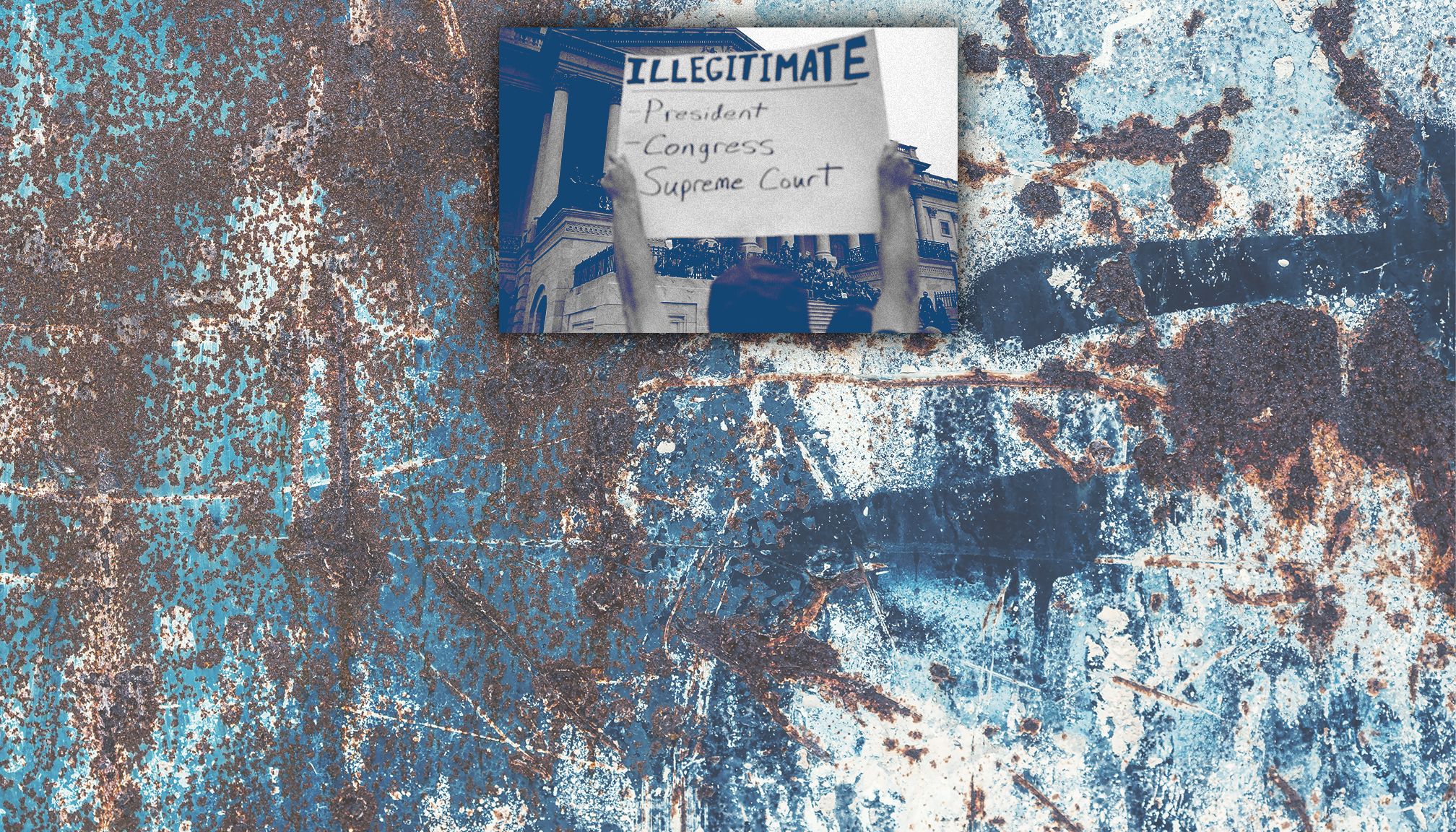Undermining the Supreme Court is incredibly dangerous
The Kavanaugh controversy has many eager to strip the court of its legitimacy. That's a terrible idea.


What does it look like when the Supreme Court loses its legitimacy? We don't want to find out.
Now that Brett Kavanaugh has been appointed to the court after a long and incredibly messy confirmation process, some have suggested this is the moment the institution loses its standing in the eyes of the American public.
It's the perfect assertion for our overheated times. But the court building still stands, the justices are still hearing arguments — Kavanaugh will apparently start hearing cases on Tuesday — and they'll still make rulings that span the range of American political and legal life. Does the court really need legitimacy to do its work?
Subscribe to The Week
Escape your echo chamber. Get the facts behind the news, plus analysis from multiple perspectives.

Sign up for The Week's Free Newsletters
From our morning news briefing to a weekly Good News Newsletter, get the best of The Week delivered directly to your inbox.
From our morning news briefing to a weekly Good News Newsletter, get the best of The Week delivered directly to your inbox.
Well, yes.
For more than 200 years, the Supreme Court has served as the final word, more or less, on the hot constitutional issues of the day. But that power, known as "judicial supremacy," isn't written into the Constitution — the court claimed it back in 1803 in Marbury v. Madison. Americans have mostly agreed to go along with it ever since.
But what if they didn't? There are already rumblings on the left that it's time to stop letting the court have the last word.
"Both liberals and conservatives have at points decried judicial supremacy," Slate writer Jamelle Bouie tweeted Saturday, "and the pendulum seems to be swinging toward liberal opposition to the Court as final arbiter of constitutional questions, as it again threatens the ability of lawmakers to regulate economic life."
While judicial supremacy has the power of tradition and consensus, there have been challenges over time. Perhaps most famously, in 1832 President Andrew Jackson ignored a Supreme Court ruling involving Native American rights in the state of Georgia. "John Marshall has made his decision," he reportedly said. "Now let him enforce it."
The story may be apocryphal. The spirit of it, however, has remained alive in the American tradition — particularly in conservative politics of recent decades. Brown v. Board of Education provoked resistance across the South, but President Dwight Eisenhower backed the court by sending troops to Little Rock.
Even as conservatives and the Federalist Society pursued a long game of capturing a court majority in recent decades, they also pushed to delegitimize the court in a fashion that amounted to a soft challenge of judicial supremacy. With every left-leaning ruling came complaints about "unelected activist judges" — a suggestion that, in American democracy, the courts should defer to elected branches of government.
Of course, it's easy to advocate for limited government authority when your ideological faction spends most of its time out of power, and those notions often change when power is acquired. Ideas about challenging judicial supremacy developed when liberalism was ascendant in the United States. Indeed, a conservative Supreme Court hasn't always been deferential to the judgments of elected officials — witness, as a prime example, the gutting of the Voting Rights Act by the Roberts Court back in 2013. And the eagerness of conservatives to overturn ObamaCare through lawsuits suggests that deferring to elected branches isn't all that important to conservatives anymore.
Conversely, as Democrats and liberals become accustomed to minority status in government, they have found themselves suddenly open to concepts once espoused by conservatives. Lots of folks on the left seem to have discovered the virtues of federalism in the last two years; a Democratic agenda that includes diminishing the power of the court would be one more step in the massive realignment of American politics that seems to be underway.
But pursuing and working for that delegitimization would be a mistake. Why? Because it's helpful to have an institution that has the last word. Supreme Court rulings don't end moral and philosophical arguments, but they can provide stopgap legislation on hot-button issues while culture and politics continue to evolve. Yes, sometimes its decisions are flat-out bad. But still, they can lower the temperature of our political arguments while allowing progress over time. What's more, a conservative court — while it may not be to liberal liking — can still play a critical role in defending our rights. William Rehnquist led a Supreme Court that put some restrictions on President George W. Bush during the early days of the War on Terror. What if Bush had responded as Jackson did: "Justice Rehnquist has made his decision. Now let him enforce it." The result would not have been good for freedom.
Another problem with the delegitimization agenda: It mostly works if you are in control of one of the other two branches of government. At this moment, undermining the authority of the Supreme Court means empowering a White House and Congress that are both held by Republicans. Maybe that changes after next month's midterms, maybe it doesn't. A conservative court may be just a minor obstacle to President Trump's plans, but it can still be an obstacle. Liberals surely don't want to be part of inadvertently making life easier for Trump, do they?
The court's loss of moral authority may well happen organically. Certainly, many Americans have reason to dislike the confirmation process that put Brett Kavanaugh on the bench, and the countermajoritarian structure of American governance that made it possible. But Democrats who favor actively undermining the court — or who propose silly ideas like court-packing — are offering short-term solutions to a long-term problem, and doing so in a way that may actually create more problems. If the Supreme Court is going to delegitimize itself, we'll find out soon enough. No reason to help it along.
A free daily email with the biggest news stories of the day – and the best features from TheWeek.com
Joel Mathis is a writer with 30 years of newspaper and online journalism experience. His work also regularly appears in National Geographic and The Kansas City Star. His awards include best online commentary at the Online News Association and (twice) at the City and Regional Magazine Association.
-
 The last words and final moments of 40 presidents
The last words and final moments of 40 presidentsThe Explainer Some are eloquent quotes worthy of the holders of the highest office in the nation, and others... aren't
-
 The JFK files: the truth at last?
The JFK files: the truth at last?In The Spotlight More than 64,000 previously classified documents relating the 1963 assassination of John F. Kennedy have been released by the Trump administration
-
 'Seriously, not literally': how should the world take Donald Trump?
'Seriously, not literally': how should the world take Donald Trump?Today's big question White House rhetoric and reality look likely to become increasingly blurred
-
 Will Trump's 'madman' strategy pay off?
Will Trump's 'madman' strategy pay off?Today's Big Question Incoming US president likes to seem unpredictable but, this time round, world leaders could be wise to his playbook
-
 Democrats vs. Republicans: which party are the billionaires backing?
Democrats vs. Republicans: which party are the billionaires backing?The Explainer Younger tech titans join 'boys' club throwing money and support' behind President Trump, while older plutocrats quietly rebuke new administration
-
 US election: where things stand with one week to go
US election: where things stand with one week to goThe Explainer Harris' lead in the polls has been narrowing in Trump's favour, but her campaign remains 'cautiously optimistic'
-
 Is Trump okay?
Is Trump okay?Today's Big Question Former president's mental fitness and alleged cognitive decline firmly back in the spotlight after 'bizarre' town hall event
-
 The life and times of Kamala Harris
The life and times of Kamala HarrisThe Explainer The vice-president is narrowly leading the race to become the next US president. How did she get to where she is now?



